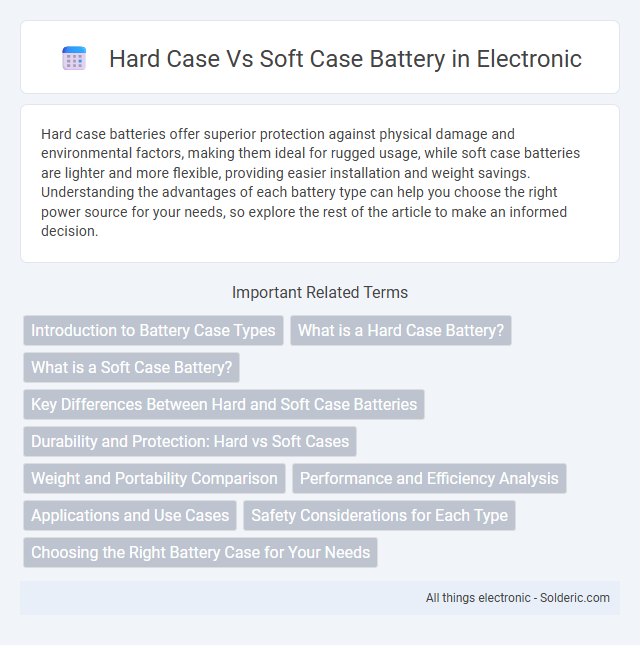Hard case batteries offer superior protection against physical damage and environmental factors, making them ideal for rugged usage, while soft case batteries are lighter and more flexible, providing easier installation and weight savings. Understanding the advantages of each battery type can help you choose the right power source for your needs, so explore the rest of the article to make an informed decision.
Comparison Table
| Feature | Hard Case Battery | Soft Case Battery |
|---|---|---|
| Durability | High, rigid outer shell protects against physical damage | Lower, flexible pouch offers limited mechanical protection |
| Weight | Heavier due to solid casing materials | Lighter, made with flexible, lightweight materials |
| Shape and Size | Fixed shape and size, less flexible | Flexible shape, adaptable to different designs |
| Thermal Management | Better heat dissipation due to solid structure | Moderate, limited heat dissipation capability |
| Cost | Generally higher manufacturing cost | Lower cost due to simpler materials |
| Applications | Automotive, power tools, heavy-duty use | Consumer electronics, wearable devices |
Introduction to Battery Case Types
Hard case batteries offer rigid, impact-resistant protection ideal for heavy-duty use, while soft case batteries feature flexible, lightweight enclosures designed for ease of installation and space-saving applications. Your choice between these battery case types depends on factors such as durability requirements, environmental conditions, and specific device compatibility. Understanding the structural differences helps optimize battery performance and longevity in various applications.
What is a Hard Case Battery?
A hard case battery features a rigid, protective outer shell made from durable materials such as plastic or metal, providing enhanced impact resistance and durability for devices. It is commonly used in laptops, power tools, and other electronics that require robust protection against physical damage and environmental factors. Choosing a hard case battery can increase your device's lifespan by safeguarding the internal cells from shocks, drops, and moisture.
What is a Soft Case Battery?
A soft case battery, also known as a pouch cell, features a flexible, lightweight outer casing made from laminated aluminum-plastic film instead of rigid metal. This design allows for higher energy density and greater adaptability in shape and size, making soft case batteries ideal for compact and portable electronic devices. Their lightweight and flexible structure improves thermal management and reduces overall device weight compared to traditional hard case batteries.
Key Differences Between Hard and Soft Case Batteries
Hard case batteries feature rigid plastic or metal shells that provide enhanced durability, improved impact resistance, and better protection against environmental factors such as moisture and dust. Soft case batteries use flexible, lightweight materials like laminated aluminum foil, offering advantages in weight reduction and easier integration into compact designs but with less structural protection. The choice between hard and soft case batteries hinges on application requirements, balancing robustness and physical protection against flexibility and weight considerations.
Durability and Protection: Hard vs Soft Cases
Hard case batteries provide superior durability and protection against impacts, crushing, and environmental damage, making them ideal for rugged applications and harsh conditions. Soft case batteries offer lightweight and flexible protection but are more susceptible to punctures, swelling, and physical damage, limiting their use in demanding environments. The choice between hard and soft case batteries depends on the required level of durability, with hard cases ensuring enhanced safety and structural integrity.
Weight and Portability Comparison
Hard case batteries typically have a heavier and more rigid structure, providing enhanced protection but reducing portability. Soft case batteries are lighter and more flexible, making them easier to carry and ideal for applications where weight is a critical factor. Your choice depends on balancing durability with the convenience of lightweight design for your specific needs.
Performance and Efficiency Analysis
Hard case batteries typically offer superior structural integrity, resulting in enhanced thermal management and longer lifespan under high-performance conditions. Soft case batteries provide better energy density and weight savings, which can improve efficiency in portable devices but may sacrifice durability and heat dissipation. Your choice between hard case and soft case batteries should balance the need for robust performance against the importance of lightweight and compact design for optimized energy efficiency.
Applications and Use Cases
Hard case batteries excel in applications requiring robust protection and durability, such as automotive, industrial machinery, and military equipment, where impact resistance and environmental sealing are critical. Soft case batteries, favored in consumer electronics like smartphones, laptops, and wearable devices, offer lightweight and flexible design benefits that enhance portability and space efficiency. Your choice between hard and soft case batteries should align with the device's usage environment and mechanical stress tolerance.
Safety Considerations for Each Type
Hard case batteries provide enhanced physical protection against impacts and punctures, reducing the risk of internal damage and potential fire hazards. Soft case batteries, while lighter and more flexible, require careful handling and storage to prevent swelling, leaks, or short circuits that compromise safety. You should choose the battery type based on your specific safety needs and usage environment to minimize risks effectively.
Choosing the Right Battery Case for Your Needs
Selecting the right battery case depends on your priorities between durability and portability; hard cases offer superior protection against impacts and drops, making them ideal for rugged environments. Soft cases provide lightweight, flexible storage with easier access and added comfort, suitable for everyday use and travel convenience. Assessing your lifestyle and device usage helps determine whether a hard or soft case best supports your battery's safety and accessibility.
Hard case vs soft case battery Infographic

 solderic.com
solderic.com